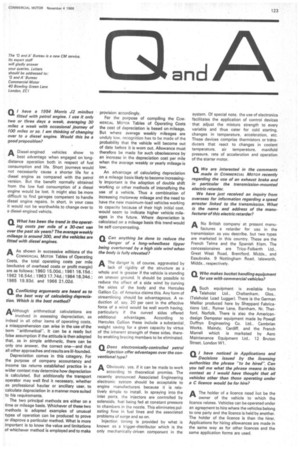Q Conflicting arguments are heard as to the best way of calculating depreciation. Which is the best method?
Page 125

If you've noticed an error in this article please click here to report it so we can fix it.
AAlthough arithmetical calculations are
involved in assessing depreciation, as indeed in all other items of operating costs, a misapprehension can arise in the use of the term "arithmetical". It can be a ready but false assumption if the attitude is then adopted that, as in simple arithmetic, there can be only one answer, the correct one—and that all other approaches and results are ill-founded.
Depreciation comes in this category. For the purpose of company accountancy and income tax returns established practice in a wider context may determine how depreciation is calculated. But additionally the transport operator may well find it necessary, whether as professional haulier or ancillary user, to calculate depreciation in a manner more suited to his requirements.
The two principal methods are either on a time or mileage basis. Whichever of these two methods is adopted examples of unusual types of operation can be produced to prove or disprove a particular method. What is more important is to know the value and limitations of whichever method is employed and to make provision accordingly.
For the purpose of compiling the COMMERCIAL MOTOR Tables of Operating Costs the cost of depreciation is based on mileage. But where average weekly mileages are unduly low, recognition has to be made of the probability that the vehicle will become out of date before it is worn out. Allowance must therefore be made for such obsolescence by an increase in the depreciation cost per mile when the average weekly or yearly mileage is low.
An advantage of calculating depreciation on a mileage basis likely to become increasingly important is the adoption of double shift working or other methods of intensifying the use of a vehicle. Thus a combination of increasing motorway mileage and the need to have the new maximum-load vehicles working to capacity because of their high initial cost, would seem to indicate higher vehicle mileages in the future. Where depreciation is calculated on a mileage basis this trend would be self-compensating.








































































































































































